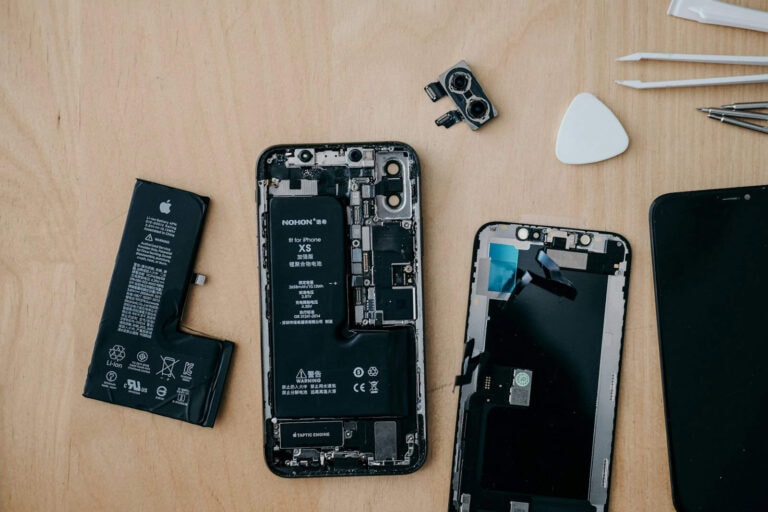
Searching for the right home phone solution in today’s digital world can be overwhelming. With so many options available, finding a VoIP (Voice over Internet Protocol) service that meets your needs requires understanding what features matter most for your household. Traditional landlines are becoming a thing of the past as more people switch to internet-based calling systems.
The best VoIP phone for your home will offer excellent call quality, affordable pricing, and convenient features like caller ID, voicemail, and call forwarding while eliminating the need for expensive traditional phone service. Modern VoIP systems connect to your existing internet connection, allowing you to use regular cordless phones or specialized VoIP devices to make crystal-clear calls. You can enjoy advanced features that weren’t possible with old telephone technology, all while potentially saving money on your monthly communication expenses.
1: Vonage Home Plan
Vonage offers affordable VoIP phone service for your home with plans starting at just $9.99 per month. This budget-friendly option makes it an attractive choice if you’re looking to replace traditional landline service.
To use Vonage, you’ll need a high-speed internet connection. Their service works by converting your voice into digital signals that travel over your internet connection rather than traditional phone lines.
The basic home plan includes many standard features you’d expect from a home phone service. You can make and receive calls just like with a regular landline, but often at a lower cost.
One advantage of Vonage is their extensions feature. This allows you to make and receive calls on up to two additional registered phones at your home calling plan rates.
When comparing VoIP providers, Vonage stands out for its ease of use. The setup process is straightforward, making it accessible even if you’re not tech-savvy.
Vonage doesn’t require an annual contract, giving you flexibility if your needs change. However, be aware that additional taxes and fees apply beyond the advertised price.
According to Reddit users discussing Vonage, many consider it when looking for a VoIP service to replace home phone service due to its competitive pricing.
You can explore different calling plans and pricing on their website to find one that fits your needs, especially if you make international calls regularly.
2: Ooma Telo Air
The Ooma Telo Air stands out as a versatile VoIP home phone solution that offers both convenience and flexibility. This wireless adapter connects to your Wi-Fi network, eliminating the need for wired connections throughout your home.
You can place the Telo Air anywhere in your house thanks to its wireless connectivity. This freedom lets you optimize your setup based on your home layout rather than being restricted by cable placement.
The device pairs with your mobile phone, allowing you to answer incoming mobile calls from any connected home phone. This integration creates a seamless communication experience between your mobile and home phone systems.
Ooma has earned top ratings from Consumer Reports for its phone service quality. When you choose the Telo Air, you’re selecting a system with a strong reputation for reliability.
The Ooma Telo Air utilizes PureVoice HD technology to deliver crystal-clear calling and excellent voice quality. Your conversations will sound natural and crisp, enhancing your overall communication experience.
You can purchase the Telo Air with cordless handsets included. Some packages offer multiple handsets with features like HD voice clarity, built-in speakerphones, and detailed call logs.
The base phone service comes with a $0 monthly fee, though premium features may require additional subscriptions. This makes it an economical choice for establishing reliable home phone service.
3: Yealink T54W IP Phone
The Yealink T54W offers a professional communication solution that can elevate your home office setup. This versatile device supports 16 VoIP accounts, making it ideal if you need multiple lines for different purposes.
You’ll appreciate the 4.3-inch color display with adjustable viewing angles that helps you see call information clearly from anywhere in your workspace. The backlit screen ensures visibility even in dim lighting conditions.
Connectivity options are abundant with this model. It features built-in Bluetooth 4.2 and dual-band Wi-Fi (2.4G/5G), giving you flexibility in how you connect and use the device.
For conference calls, the T54W delivers impressive performance with 5-way voice conferencing, perfect for family calls or work meetings from home.
The T54W works seamlessly with popular UC platforms. You can connect it to your PC via Bluetooth to handle calls from Teams, Zoom, and RingCentral, enhancing your communication options.
Priced at around $159.98, this phone represents a solid investment for your home office. It’s designed for users with moderate to heavy call volumes, making it suitable if your home business relies heavily on phone communication.
4: Panasonic KX-TG9541B
The Panasonic KX-TG9541B stands out as a versatile option for your home VOIP needs. This system functions as a 2-line cordless phone that can handle both traditional landlines and VOIP services simultaneously.
One of the most impressive features is the Link2Cell capability. This allows you to sync your smartphone to the phone system via Bluetooth, effectively giving you a 3-line communication setup.
The phone system comes with DECT 6.0 Plus technology which ensures clear sound and long-range signal security throughout your home. You won’t have to worry about dropped calls as you move around.
Users appreciate the KX-TG9541B for its user-friendly setup process. Even if you’re not tech-savvy, you’ll find it easy to configure for your home VOIP needs.
The expandability feature is worth noting. You can add up to 6 handsets to the system, making it ideal for larger homes or small home offices where multiple people need access to the phone lines.
The built-in digital answering system ensures you never miss important calls. You can check your messages from any handset in your home, adding convenience to your daily communication.
5: Grandstream GXP2130
The Grandstream GXP2130 is a high-end IP phone that could be an excellent choice for your home office setup. This professional device supports 3 lines and 3 SIP accounts, giving you flexibility to manage multiple calls or phone lines from a single device.
You’ll appreciate the visual clarity of its 2.8-inch color screen, which makes navigating through options and viewing caller information straightforward. The phone includes 8 BLF/speed-dial keys that let you easily monitor presence and transfer calls to other extensions in your home system.
For connectivity, you get dual Gigabit ports with integrated Power over Ethernet (PoE). This means faster network connections and the option to power your phone through your Ethernet cable, reducing cable clutter on your desk.
The GXP2130 delivers HD audio quality for superior sound whether you’re using the handset, speakerphone, or a compatible headset. It’s particularly useful if you need to monitor medium to high call volumes from your home office.
For headset users, the phone features integrated Electronic Hook-Switch compatibility with Plantronics headsets. You can also use other options like Poly VOYAGER FOCUS UC, though some users report occasional disconnection issues.
6: Cisco SPA303
The Cisco SPA303 is a versatile 3-line business-class IP phone that works well in home office settings. It connects directly to internet telephone services, making it a practical choice for your home VoIP setup.
This phone offers exceptional voice clarity that helps you communicate professionally from home. The enhanced speaker quality ensures you won’t miss important details during calls, even when using the speakerphone function.
The SPA303 features a monochrome LCD display that shows call information clearly. You get 3 line keys and 4 soft keys for easy navigation and call management without complicated menus.
For comfort during long calls, you can connect a headset using the 2.5 mm jack connector. This feature is particularly useful if you spend hours on the phone daily.
The phone includes a 2-port Fast Ethernet switch that allows you to connect your computer through the phone, saving you an additional network port.
Advanced features include easy station moves and shared line appearances across different locations. These business-grade capabilities make the SPA303 more versatile than typical home phones.
You can find this model as a certified refurbished option on Amazon, which offers good value if you’re setting up a home office on a budget.
The SPA303 works as an extension-only option in some configurations, giving you flexibility depending on your specific needs.
7: Polycom VVX 300
The Polycom VVX 300 is a powerful entry-level business media phone that could be an excellent choice for your home office setup. This 6-line VoIP phone is designed for users who handle a low to moderate volume of calls but still need crystal clear communications.
You’ll appreciate the excellent voice quality of the VVX 300. Both the speakerphone and handset deliver remarkable clarity, which is impressive for an entry-level phone.
The phone includes customizable backlight brightness settings. You can adjust the brightness in both active and idle modes, choosing from four options: high, medium, low, or off depending on your lighting preferences.
Many users find this landline phone provides all the necessary functionality for a standard home office. It’s consistently rated as reliable and offers good value for money.
If you’re setting up a home office where you need dependable voice communications, the VVX 300 could be ideal. It’s particularly well-suited if you’re transitioning from an older phone system but don’t need advanced features of more expensive models.
The phone is designed for longevity. Many businesses have used these phones successfully for years as replacements for older models like the Polycom 501.
8: AT&T TL86109
The AT&T TL86109 offers a unique combination of corded and cordless phone functionality with VOIP capabilities. This versatile system brings together traditional home phone service with modern connectivity options.
You’ll appreciate the long-range coverage and clarity provided by its unique antenna design and advanced noise-filtering technology. This ensures your calls remain clear even as you move around your home.
One standout feature is the Connect to Cell technology. This allows you to make and receive calls on your cell phone plan while using your home phone system. You can pair up to two Bluetooth-compatible cell phones.
The TL86109 supports two lines, making it ideal for homes that need to manage multiple calls. The system includes caller ID and call waiting functions to help you manage your communications effectively.
You’ll find the built-in digital answering system convenient for recording messages when you’re unavailable. The base unit includes a speakerphone for hands-free conversations.
The system is expandable, allowing you to add more handsets as needed. This makes it a flexible option that can grow with your needs.
For those who work from home, the two-line capability provides a practical way to separate personal and business calls. The DECT 6.0 technology ensures secure, interference-free communications.
9: Google Voice
Google Voice is a versatile VoIP option that can replace your traditional landline. It offers free calling within the US and low international rates, making it an attractive choice for budget-conscious homeowners.
You can use Google Voice with your existing smartphones through the app, or connect it to physical phones for a more traditional setup. For the latter option, you’ll need compatible hardware.
The Grandstream HT801 is a popular analog telephone adapter (ATA) that lets you use regular analog phones with Google Voice. This device creates a bridge between your internet connection and traditional phones.
For a more professional setup, you might consider IP phones specifically designed for VoIP services. The Poly Edge B20 is an entry-level option with impressive sound quality and user-friendly features like illuminated keys.
If you’re looking for superior audio quality, the Poly VVX 450 offers exceptional sound, particularly through its speakerphone function.
You can also add Google Fiber Phone service for just $10 monthly if you’re already a Google Fiber internet customer. This gives you unlimited nationwide calling through their VoIP service.
The Ooma Telo is another compatible option that includes a handset and offers unlimited nationwide calling, with a mobile app for calls on the go.
10: magicJack Home
MagicJack Home is a budget-friendly VoIP phone solution that might be perfect for your household needs. This compact device connects to your home network to provide unlimited local and long-distance calling throughout the US and Canada.
Setting up magicJack is straightforward. You simply connect the adapter to your internet router, plug in a standard telephone, and you’re ready to make calls. The device is portable, making it convenient if you need to take your phone service with you when traveling.
One of the biggest advantages of magicJack Home is the cost savings. You can say goodbye to traditional phone bills with their service plans. The device typically comes with 12 months of service included in the initial purchase price.
The new 2024 magicJack model offers improved call quality and reliability compared to previous versions. Many users find the voice clarity comparable to traditional landlines when used with a good internet connection.
You can keep your existing phone number when switching to magicJack, which makes the transition seamless. The service also includes features like voicemail, caller ID, and call waiting at no extra cost.
For those concerned about unwanted calls, magicJack offers a robo-call screening feature to prevent automated spam calls from reaching you.
Understanding VoIP Technology
Voice over Internet Protocol technology has revolutionized how we make phone calls by using internet connections instead of traditional phone lines. This modern approach offers both technical advantages and practical benefits for home users.
What is VoIP?
VoIP (Voice over Internet Protocol) is a technology that lets you make phone calls using your internet connection rather than a regular phone line. Instead of using copper wires like traditional phones, VoIP converts your voice into digital data packets and sends them through the internet.
When you speak into a VoIP phone, your voice is:
- Converted from analog sound to digital data
- Compressed into small data packets
- Transmitted over the internet
- Reassembled at the destination
- Converted back to sound for the receiver to hear
VoIP systems can work with special VoIP phones, regular phones with adapters, or even as software applications on your computer or smartphone. This flexibility makes it easy to set up in most homes without requiring extensive new equipment.
You need a stable internet connection with enough bandwidth to handle calls clearly. Most home broadband connections today are more than capable of supporting quality VoIP service.
Benefits of Using VoIP at Home
Switching to VoIP for your home phone service offers several significant advantages over traditional landlines:
Cost Savings: VoIP services typically cost much less than traditional phone lines. Many providers offer unlimited calling plans at fixed monthly rates, and calls made over the internet are generally cheaper than those made through phone companies.
Flexibility: You can use your home phone number from anywhere with internet access. This means you can take calls at home, while traveling, or even redirect them to your mobile device.
Advanced Features: VoIP systems come with numerous features that would cost extra with traditional phones:
- Voicemail-to-email conversion
- Call forwarding and routing
- Video calling
- Conference calling
- Automated attendants
Easy Setup: Most VoIP systems are plug-and-play, requiring minimal technical knowledge to install and configure. You can usually set everything up yourself without professional help.
Key Features to Consider
When shopping for a VoIP home phone service, several critical features will determine how well the system meets your needs. These features impact everything from call clarity to how easily the service integrates with your existing technology.
Call Quality Factors
Voice quality is perhaps the most important aspect of any VoIP service. Look for providers that offer HD voice capabilities, which deliver clearer sound than traditional phone lines.
Bandwidth requirements are crucial – most quality VoIP calls need at least 100 kbps upload and download speeds for each simultaneous call. Many providers like Ooma offer Quality of Service (QoS) features that prioritize voice traffic over other data.
Check if the service includes echo cancellation and jitter buffering technologies. These features compensate for network inconsistencies and ensure smooth conversations without awkward delays or audio gaps.
Consider how the system handles power outages – some VoIP systems offer battery backup options or automatic forwarding to mobile devices when power is lost.
Compatibility with Home Devices
Your VoIP system should work seamlessly with your existing technology. Many modern VoIP providers offer support for various desk phones as well as mobile apps for smartphones and tablets.
Check if the service works with:
- Your existing home internet router
- Smart home systems (Amazon Echo, Google Home)
- Traditional phone handsets (using adapters)
- Multiple devices simultaneously
Many VoIP systems offer document integration capabilities, allowing you to receive faxes and voicemails as email attachments or text messages. This feature bridges your communication across platforms.
Look for services with number portability so you can keep your existing phone number when switching providers. This saves you from updating your contact information with friends and businesses.
User-Friendly Interfaces
An intuitive interface makes managing your VoIP system much easier. The best systems offer simple web dashboards and mobile apps to control settings.
Key interface features to look for include:
- Visual voicemail with text transcription
- Call logs that are easy to search and filter
- Contact management that syncs with your devices
- One-touch call blocking for unwanted callers
Automated attendant features can route calls based on time of day or caller ID. Look for customizable greeting options that create a professional impression for home-based businesses.
The ability to easily manage features like call forwarding, three-way calling, and caller ID settings without technical expertise is essential for home users. The best interfaces require minimal clicks to make adjustments.
Security and Privacy Considerations
When using VoIP for your home phone service, keeping your conversations private and your personal data secure should be top priorities. Modern VoIP systems offer strong protection, but understanding the specific security features helps you make informed choices.
Protecting Your VoIP Calls
Your home VoIP system needs proper safeguards to prevent unauthorized access. Start by creating strong passwords for all your VoIP accounts and devices. Avoid using default passwords that come with your equipment.
Set up a separate Wi-Fi network specifically for your VoIP traffic when possible. This network isolation helps protect your calls from other potentially vulnerable devices in your home.
VoIP security vulnerabilities can include eavesdropping and call hijacking. To prevent these issues:
- Enable two-factor authentication on your VoIP accounts
- Keep your router firmware updated
- Use a VPN when making calls over public Wi-Fi
- Consider providers with built-in security features
According to recent comparisons, Google Voice ranks highly for security among home VoIP options, but several other providers also offer robust protection.
Understanding Encryption Technologies
Encryption is your first line of defense against eavesdropping. Look for VoIP services that use TLS (Transport Layer Security) and SRTP (Secure Real-time Transport Protocol) to encrypt your conversations.
TLS secures the connection setup, while SRTP protects the actual voice data during your call. Together, they create a secure channel for your communications.
When comparing providers, ask specifically about their encryption standards. The best home VoIP services will clearly explain their security measures rather than using vague marketing terms.
Some key encryption features to look for:
- End-to-end encryption capability
- AES-256 encryption standard
- Secure login protocols
- Regular security audits by the provider
Remember that even with strong encryption, your calls are only as secure as your home network. Update your router’s firmware regularly and use WPA3 encryption if your equipment supports it.
Frequently Asked Questions
VoIP phone systems offer many benefits for home users, but choosing the right equipment and service can be confusing. Here are answers to common questions about home VoIP solutions.
What are the top-rated VoIP phones for residential use?
The Yealink T54W IP Phone stands out as one of the best VoIP phones for home use, offering excellent call quality and a user-friendly interface. This model provides professional features in a compact design perfect for home offices.
The Grandstream GXP2130 is another top choice with its crisp HD audio and affordable price point. Many home users appreciate its multiple line capabilities and customizable function keys.
For a complete system, the Ooma Telo Air offers an all-in-one solution that consistently receives high ratings for ease of setup and reliable performance. The Panasonic KX-TG9541B is ideal if you need multiple handsets throughout your home.
How does VoIP technology integrate with home phone systems?
VoIP technology converts your voice into digital signals that travel over your internet connection. You can integrate VoIP with your existing home setup by connecting an eMTA device to your router.
Many systems like the Ooma Telo Air work with your existing phones using adapters, eliminating the need to purchase all new equipment. This makes the transition from traditional phone service relatively seamless.
Your home internet connection serves as the backbone for VoIP service, so a stable connection is essential for clear calls. Most modern home internet services provide sufficient bandwidth for quality VoIP performance.
What are the most cost-effective VoIP services for home?
Vonage Home Plan offers excellent value with unlimited calling and feature-rich packages starting around $15 per month. Their plans include popular features like voicemail-to-email and caller ID at no extra cost.
Ooma provides a unique pricing model where you purchase the Telo device upfront, then pay only monthly taxes and fees (typically under $10). This can result in significant long-term savings for budget-conscious households.
You can compare top residential VoIP providers to find the most cost-effective option for your specific calling needs. Many services offer free trials so you can test before committing.
Can VoIP phones be used with traditional home routers?
Yes, most VoIP phones work with standard home routers without requiring special equipment. Your existing router likely has sufficient Ethernet ports to connect VoIP phones directly.
For wireless connectivity, models like the Yealink T54W offer built-in Wi-Fi capabilities that connect to your existing wireless network. This flexibility allows you to place phones wherever they’re most convenient in your home.
Quality of service (QoS) settings on newer routers can prioritize voice traffic to ensure clear calls even when other devices are using your network. Some VoIP providers recommend specific router settings for optimal performance.
What features should be considered when choosing a VoIP provider for home?
Call quality should be your top priority – look for providers offering HD voice capabilities. The difference in clarity compared to traditional phone lines can be remarkable.
Check if the provider allows you to keep your existing phone number, as this convenience factor saves you from notifying contacts about a number change. Most reputable providers offer free number porting.
Examine the included features like voicemail, call forwarding, and caller ID. Advanced features such as simultaneous ring on multiple devices or voicemail transcription may be important depending on your needs.
Are there any VoIP services that offer free calling plans for residential customers?
Google Voice provides free calls within the US and Canada, though you’ll need to purchase hardware separately. This service integrates well with other Google products you might already use.
Some VoIP providers offer limited free tiers that allow calls to other users on the same service at no cost. These can be good options if your frequent contacts use the same service.
Free services typically have limitations compared to paid options. They might display ads, offer fewer features, or have call quality issues during peak times. For reliable daily use, paid services generally provide better value and dependability.






